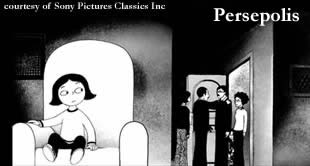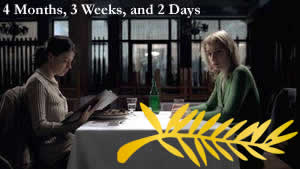 Two filmmakers made impressive breakthroughs this year at Cannes. As the festival celebrated its 60th anniversary, the jury gave the top prize to <B>Cristian Mungiu</b> for <b><i>4 Months, 3 Weeks, and 2 Days</i></b>, making it the first time a Romanian won the prestigious Palme d’Or. It also gave the Jury Prize (in a tie with <b>Carlos Reygadas</b> for <b><i>Silent Night</i></b>) to an Iranian woman, <b>Marjane Satrapi</b>, and her co-director, <b>Vincent Paronnaud</b>, for <b><i>Persepolis</i></b>, an animation film based on Satrapi’s graphic novels about growing up during and after Iran’s 1979 revolution.
Two filmmakers made impressive breakthroughs this year at Cannes. As the festival celebrated its 60th anniversary, the jury gave the top prize to <B>Cristian Mungiu</b> for <b><i>4 Months, 3 Weeks, and 2 Days</i></b>, making it the first time a Romanian won the prestigious Palme d’Or. It also gave the Jury Prize (in a tie with <b>Carlos Reygadas</b> for <b><i>Silent Night</i></b>) to an Iranian woman, <b>Marjane Satrapi</b>, and her co-director, <b>Vincent Paronnaud</b>, for <b><i>Persepolis</i></b>, an animation film based on Satrapi’s graphic novels about growing up during and after Iran’s 1979 revolution.
Considering the awards they bestowed, two observations can be made about the juries at the festival. First, they were not afraid of praising films about deeply sobering topics. Top prizes went to works dwelling on the sad and difficult turf of abortion, death and loss, aging, paralysis, cultural dislocation, marital failure, and mourning. For example, Naomi Kawase from Japan took the Grand Prize for The Mourning Forest. Second, if the juries liked a film, they really liked it, because of the few award winners, several were multiple winners. In an Official Competition that included a healthy dose of Cannes veterans and even veteran laureates (consider Alexander Sokurov, Quentin Tarantino, Wong Kar Wai, Gus Van Sant, Bela Tarr, Emir Kusturica, and Joel and Ethan Coen), it was generally the little-known filmmakers who stood out and received distinctions.
the Grand Prize for The Mourning Forest. Second, if the juries liked a film, they really liked it, because of the few award winners, several were multiple winners. In an Official Competition that included a healthy dose of Cannes veterans and even veteran laureates (consider Alexander Sokurov, Quentin Tarantino, Wong Kar Wai, Gus Van Sant, Bela Tarr, Emir Kusturica, and Joel and Ethan Coen), it was generally the little-known filmmakers who stood out and received distinctions.
The main jury, headed by Stephen Frears, also included Maggie Cheung, Maria De Medeiros, Abderrahmane Sissako, Orhan Pamuk, Toni Collette, Michel Piccoli, Marco Bellocchio, and Sarah Polley. It gave the Camera d’Or to Etgar Keret and Shira Geffen for Jellyfish and the Best Screenplay award to Fatih Akin for The Edge of Heaven, each winning another award as well. Control, by Dutch filmmaker Anton Corbijn, picked up two awards and two special mentions. In addition to the Palme d’Or, Cristian Mungiu also won the esteemed FIPRESCI (International Federation of Film Critics) Award as well as a French National Education Administration Prize, which will issue a teaching DVD of his film to elicit analysis and debate in classrooms.
 While Satrapi, based in Paris and competing for France, referred to her film as “universal,” she dedicated it “to all Iranians.” Mungiu included himself in a wave of Romanian cinema that he considered as having already arrived in the last few years. He hoped that the award would help launch other “small filmmakers in small countries everywhere” who don’t really need “big budgets and a lot of stars” for their stories to be heard. Fresh from Cannes, 4 Months, 3 Weeks, and 2 Days will be screened at the Los Angeles Film Festival’s “International Spotlight – Romania,” supported by the Southeast European Film Festival in association with Cinema Without Borders. Also screening will be Marilena from P7 by Mungiu’s countryman, Cristian Nemescu, whose California Dreamin’ was screened this year at Cannes in Un Certain Regard, even though Nemescu died last year before completing the film.
While Satrapi, based in Paris and competing for France, referred to her film as “universal,” she dedicated it “to all Iranians.” Mungiu included himself in a wave of Romanian cinema that he considered as having already arrived in the last few years. He hoped that the award would help launch other “small filmmakers in small countries everywhere” who don’t really need “big budgets and a lot of stars” for their stories to be heard. Fresh from Cannes, 4 Months, 3 Weeks, and 2 Days will be screened at the Los Angeles Film Festival’s “International Spotlight – Romania,” supported by the Southeast European Film Festival in association with Cinema Without Borders. Also screening will be Marilena from P7 by Mungiu’s countryman, Cristian Nemescu, whose California Dreamin’ was screened this year at Cannes in Un Certain Regard, even though Nemescu died last year before completing the film.

